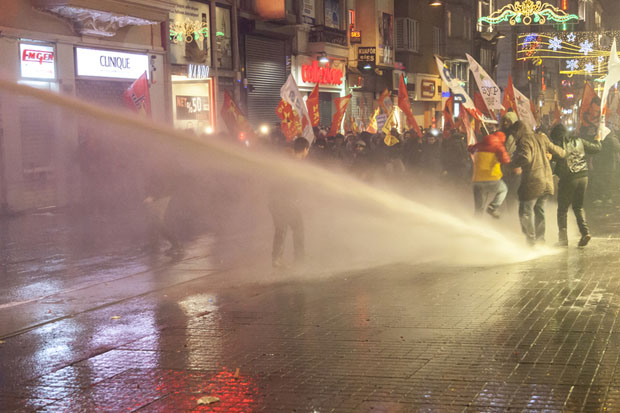17 Feb 2014 | Digital Freedom, News and features, Turkey

Over the past few weeks, the ruling Justice and Development Party (AKP) in Turkey has deployed a curated mix of paid-for advertising, op-eds in pro-government newspapers, tweets and off-the-cuff press statements to justify their curbs on internet freedom.
One of the most persistent tactics used by AKP has been so-called “porn lobby” smearing. Back in 2011, Umit Boyner, an ex-retail executive and president of the Turkish Industry and Business Association, was decried as “pro-porn” for being anti-censorship. Not only porn – “violent websites,” “instructions on how to kill your mother”, “sex with animals” and more lurid possibilities would come about, argued Bulent Arinc, deputy prime minister, if access to the web was unfettered.
More recently, pro-government newspaper The Star, convinced readers that censorship opposition was coming from the vaguely described “porn lobby.” “So would you want your child to be a victim of sexual abuse, porn, gambling or other hideous acts?” asked editors.
Tweets from AKP deputy Necdet Unuvar (“Today is safer Internet day, they used to call this a censure but they do not anymore,”) and another deputy, Cevdet Erdol, (“All forms of addiction: tobacco, drugs, alcohol, weed, Internet whatever they might be, we continue our struggle against them. For our kids“) sought to conjoin 5651 censorship with AKPs conservative, quasi-religious philosophy: As one analyst translated it “high moral laws: morals to protect the youth.”
The AKP also launched a paid-for advertising campaign: A bruised woman, clearly the victim of domestic violence, with the strapline “Violence is a crime. What about the Internet? Absence of rules does not mean liberty!”
Internet commentator Glyn Moody, who blogged about the bizarre campaign for Techdirt, told Index on Censorship “This extraordinary ad belongs to a tradition of regarding the online world as a kind of lawless “Wild West,” that needed to be tamed.”
Erdogan has also been keen to draw comparisons internationally. On the same day as 2000 protesters clashed with water-cannons in Istanbul, he told a journalist working for Al Jazeera TV network “Turkey is almost more free than some states of the European Union.” He justified his claim: “When you refer to the Gezi Park events, why do you not see the events in Frankfurt, Hamburg? Have you seen what the police did there? Why do you not see [sic] what happens in England?”
Prosecutors in Germany and England were accused of being heavy-handed after protests and street unrest in Frankfurt, Berlin and London in 2011 were met with long jail sentences.
Bulent Arinc has also argued, that Turkey is “freer compared to many other countries,” and “has freedom of the press,” although a week later international NGO Reporters Without Borders slammed the nation in a global survey of journalistic freedoms, ranking it 154th globally.
Pro-government newspapers have even posited a slightly dubious economic argument : Sabah, a daily newspaper considered very favourable towards AKP, argued that Silicon Valley giants would be keener to participate in the Turkish market as the legislation removed prison sentences in favour of punitive fines.
So did all this work? It depends on how you judge success. Emre Kizilkaya, a Turkish journalist, sees censorship as a partisan issue anyway.
“Most AKP voters support it, while almost all opposition voters are against it. So, it has become a partisan issue. As such, the PR campaign probably didn’t swing votes – but it further cemented the position of AKPs own voters.”
Pinar Tremblay, a Turkish analyst and academic, thought understanding of the laws was limited. “The majority of the people are not yet aware what the law entails, because they have not yet experienced it.”
“No matter what the government may say about protecting children or stopping violence against women through censorship,” said Gurkan Ozturan, a citizen journalist and blogger based in Turkey. “everybody knows that those issues are not being addressed to in real life, physically on the street.”
He goes on “This bill has been prepared to re-initiate the government of fear in Turkey. But as with OccupyGezi protests the people have passed beyond the fear-threshold.”
If polling data is to be believed, the AKP now commands 40-50% of Turkish approval ratings. But 5651 has provoked intense street protests, condemnation from human rights groups, and even comparisons with the early days of the Third Reich.
The passing of the legislation provoked half a million tweets, according to media reports, split across English and Turkish hashtags. The pro-censorship hashtag received a handful in comparison.
Still, President Gul – who still needs to ratify the bill, has indicated he will. Turkey is going dark, soon.
This article was posted on February 17, 2014 at indexoncensorship.org
12 Feb 2014 | Digital Freedom, News and features, Turkey

Riot police in Istanbul use water cannons on protesters against the amendments to internet law 5651 (Image: Bulent Selcuk/Demotix)
The specifics regarding website censorship and data gathering in the controversial, recently approved amendments to Turkey’s internet law remain murky. The updated bill 5651, which adds restrictions on internet users’ freedom of expression, and now only hinges on President Abdullah Gül signing it into effect, has been widely criticised.
Opponents protesting the amendments this past Saturday in Istanbul were met with water cannons and tear gas, mirroring a similar police reaction to anti-censorship demonstrations in mid-January. The changes to the law were first proposed last December, just one day after the unraveling of an ongoing corruption scandal that has embroiled Prime Minister Recep Tayyip Erdoğan and his AK Party. Opponents say increased censorship aims to harness criticism of government and prevent the spread of leaked recordings about corruption. The Republican People’s Party (CHP), Turkey’s leading opposition party, published a report warning that the new powers given to the Directorate of Telecommunication (TİB) to decide on website bans would allow the government to block and censor websites at will. “Possession of such authoritarian power doesn’t exist in democratic countries,” it says. “It’s a very familiar pattern to us of putting law through very fast without consultation, without enough expert opinion, without enough consideration,” said Emma Sinclair-Webb, a senior researcher on Turkey at Human Rights Watch.
The amendments mean judicial orders are no longer necessary for a ban to be carried out. TİB can ban websites within hours and without giving notice, which could mask the censorship to internet users. Furthermore, websites can be blocked based on URL addresses. Because this would allow offensive content on a website to be blocked while its other pages remain active, supporters of the law claim that URL-based bans are a liberal alternative to larger scale censorship.
However, the move to URL-based website blocking may further threaten media in Turkey, says Elif Akgül, freedom of expression editor for the independent news website Bianet. A number of mainstream Turkish news outlets owned by conglomerates close to the government have notably been affected by censorship in recent years. Although also subject to website blocking, smaller, independent news platforms have often been swayed less by direct government pressure. “If you’re a journalist and work in mainstream media, if you can’t publish something, you can publish it on a blog so people can read it,” Akgül said. With URL-based website bans that go into effect without any notification, alternative sources for information, like blog posts or articles on independent news sites like Bianet, may disappear suddenly if they’re considered offensive.
When leaked recordings led to Vimeo and SoundCloud being shut down temporarily in January, a court order was displayed on the sites. Most recently, a string of wiretapped phone conversations implicating corrupt business agreements and government meddling in mainstream media have surfaced on websites like SoundCloud, Vimeo and YouTube and spread through social media before the sites could be shut down. URL-based blocking may see recordings like these disappear, with no explanatory court order left in its place. Critics see the timing of the approved amendments amidst these leaks as motivated by the present government’s interest in controlling information in an election year. “Against the background of these phone calls, telling the press what to do, we’re seeing a very interventionist government that wants to control the masses,” said Sinclair-Webb.
The amended law would also make service providers store users’ internet activity records for two years. Service providers would have to forward any user information to government agencies upon request, although without informing users. An added element of the law’s ambiguity is its vague definition of service providers. Providers can mean internet service providers (ISPs) or small companies that host websites, says Berhan Soylu, an executive board member of the Chamber of Computer Engineers of Turkey. Critics argue that service providers will be forced to use deep package inspection (DPI) to collect data, which could affect internet quality. “Only some service providers have that technology for DPI because it’s a very hard thing to do and a very expensive thing. Some small companies can’t make this happen and they will have to close,” Soylu said. “After that, internet bills may increase. And internet quality, internet speed may decrease.”
Critics of the law say the use of deep package inspection to collect data will make internet users vulnerable to surveillance. For journalists, especially those working on topics the government may see as threatening, increased surveillance means they have to protect their own internet activity and communication with sources to avoid legal threats, says Akgül. “It’s going to be more difficult for us as journalists because our internet activity is going to be more dangerous to ourselves, to our sources. We have to find more secret ways,” she said.
This article was published on February 12, 2014 at indexoncensorship.org


